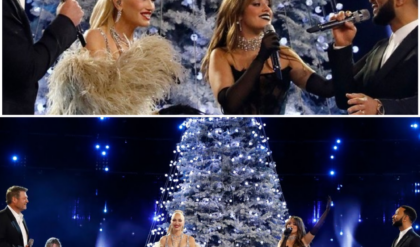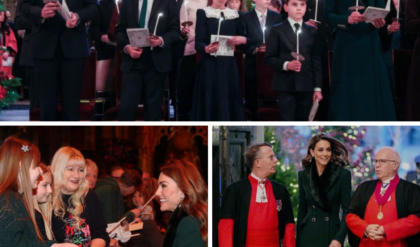True Detective: Night Country (2024), the fourth season of HBO’s acclaimed anthology series, marks Jodie Foster’s return to the crime drama genre as Liz Danvers, a hardened police chief in the fictional Alaskan town of Ennis. Set against the eerie backdrop of a polar night, where darkness reigns for weeks, the series weaves a chilling murder mystery with supernatural undertones. Central to Danvers’ arc are the recurring motifs of her late son, Holden, and a one-eyed polar bear—both as a plush toy and a living creature. These symbols, appearing in dreams, flashbacks, and visions, are more than mere plot devices; they anchor Danvers’ emotional journey, reflecting her grief, guilt, and path to healing. This article delves into the significance of Holden and the polar bear, drawing on insights from showrunner Issa López, critical analyses, and Foster’s performance to explore why these elements keep resurfacing in True Detective: Night Country.
Jodie Foster as Liz Danvers: A Study in Grief and Grit
Jodie Foster’s portrayal of Liz Danvers is a tour de force, blending the intensity of her Oscar-winning role as Clarice Starling in The Silence of the Lambs with a raw, personal edge suited to the anthology’s character-driven narrative. Danvers is a complex figure: a sharp, abrasive detective exiled to Ennis after a traumatic past, she’s both a brilliant investigator and a deeply flawed individual. Her strained relationships—with her stepdaughter Leah, her colleague Evangeline Navarro (Kali Reis), and her boss/lover Ted Connelly—stem from a tragedy that has hardened her. Foster, in a 2024 TIME interview, described Danvers as someone who “petrified herself” to cope with loss, a characterization that informs her guarded demeanor and reliance on white noise to drown out painful memories.
The series hints early on that Danvers’ son, Holden, died in a car accident alongside her husband, though details remain sparse until later episodes. Flashbacks show Holden playing with a stuffed polar bear toy, missing one eye, and engaging in a peek-a-boo game with Danvers, saying, “I see you.” These moments, coupled with Danvers’ nightmares and visions, reveal her unresolved grief. Foster’s performance captures Danvers’ struggle to suppress these emotions, her face often a mask of stoicism that cracks in private moments, such as when she finds Holden’s toy among Christmas decorations. The polar bear and Holden’s recurring presence are not just narrative hooks but emotional tethers, pulling Danvers—and the audience—into her inner turmoil.
The Polar Bear: A Symbol of Trauma and Spiritual Connection
The one-eyed polar bear, both as a plush toy and a living animal, is a potent symbol in True Detective: Night Country. Its appearances are deliberately ambiguous, blending the show’s supernatural elements with psychological realism. In the opening credits, a plush polar bear sits on a rocking chair by an icy road, followed by a real polar bear crossing the same path, both missing an eye. This imagery sets the tone for the season’s exploration of loss and the unseen. In episode 1, Danvers awakens from a nightmare hearing a child’s voice whisper, “She’s awake,” and finds Holden’s one-eyed polar bear toy on her floor. Later, Navarro encounters a real one-eyed polar bear on the road after hearing the same phrase, suggesting a shared spiritual experience.
Showrunner Issa López, in a 2024 Variety interview, explained that the polar bear is a “spiritual totem” connecting Danvers and Navarro to the truth behind the Tsalal researchers’ disappearance and the murder of activist Annie Kowtok. The bear’s missing eye, López suggested, symbolizes partial vision—seeing only part of reality, a metaphor for Danvers’ refusal to confront her grief. In Alaskan mythology, polar bears represent strength, guidance, and resilience, qualities that resonate with Navarro’s quest to solve Annie’s murder and Danvers’ eventual journey toward healing. The bear’s one-eyed appearance may also reflect the “damage” caused by the Tsalal scientists, whose experiments disrupted the balance between nature and Ennis’ Indigenous community, as noted in a ScreenRant analysis.
For Danvers, the polar bear toy is a tangible link to Holden. Its recurring presence—in her home, in flashbacks, and even in Navarro’s visions—underscores her inability to let go. In episode 4, when Danvers throws the toy into the snow in a moment of cynical defiance, Navarro later retrieves it, leaving it on Danvers’ bed in the finale as a gesture of understanding. This act, as Mashable’s Shannon Connellan notes, highlights the polar bear’s role in connecting Danvers and Navarro on a spiritual level, bridging their differences and shared losses. The bear, both plush and real, thus serves as a dual symbol: a haunting reminder of trauma and a guide toward reconciliation.
Holden: The Ghost of Guilt and Redemption
Holden’s recurring appearances in Danvers’ dreams and Navarro’s visions are central to the season’s emotional core. Though his death is never fully detailed, flashbacks and dialogue suggest he and Danvers’ husband died in a car accident, leaving Danvers wracked with guilt and feelings of inadequacy as a mother. In episode 1, her stepdaughter Leah tries to discuss the accident, but Danvers shuts her down, revealing her avoidance. By episode 4, her boss Ted alludes to a “traumatic incident” that worsened her interpersonal skills, further tying her behavior to Holden’s death. These subtle clues, as ScreenRant points out, paint Holden as a specter of Danvers’ unresolved pain.
Holden’s presence is most vivid in Danvers’ nightmares, where he whispers, “She’s awake,” and plays peek-a-boo, saying, “I see you.” On HBO’s Night Country podcast, López described this game as a metaphor for partial perception—Danvers sees only fragments of her grief, unable to fully process it. In the finale, Navarro reveals that Holden appeared in her visions, telling her he “sees” Danvers, a moment that prompts Danvers to finally grieve when she nearly drowns under the ice, believing Holden is trapped beneath. This near-death experience, as López explained, allows Danvers to confront her loss, finding “non-romantic love” with Navarro that heals them both.
Holden’s role extends beyond Danvers’ psyche, intersecting with the season’s supernatural elements. The phrase “She’s awake,” linked to both Holden and the polar bear, may refer to Annie Kowtok’s spirit seeking justice, as her murder ties to the Tsalal case. López’s deliberate ambiguity—never confirming whether these visions are supernatural or psychological—enhances their impact, making Holden a catalyst for Danvers’ redemption as she solves the case and begins to heal.
Cultural and Narrative Impact
True Detective: Night Country distinguishes itself from prior seasons by centering female protagonists and Indigenous perspectives, with the polar bear and Holden amplifying its humanistic themes. Foster’s chemistry with Reis, a former world champion boxer in her third acting role, grounds the supernatural in raw emotion. Critics, like TIME’s Judy Berman, praised the season’s “gorgeously realized story” that immerses viewers in Ennis’ unique community, contrasting with the “white machismo” of season 1. The polar bear and Holden motifs, woven into the Alaskan setting, evoke a sense of cosmic horror inspired by H.P. Lovecraft, yet remain rooted in personal loss, making the mystery deeply personal for Danvers and Navarro.
The season’s 92% Rotten Tomatoes score and 19 Emmy nominations, including Foster’s win for Outstanding Lead Actress, reflect its critical acclaim. However, some viewers found the supernatural elements—like the polar bear’s appearances—overwrought, echoing complaints about the season’s finale feeling “silly” despite its emotional resonance, as noted in The Hollywood Reporter. Regardless, the motifs of Holden and the polar bear elevate the narrative, making Danvers’ journey a standout in the True Detective franchise.
Why They Keep Coming Back
Holden and the polar bear recur because they embody Danvers’ internal conflict and the season’s blend of mystery and spirituality. For Danvers, they represent guilt and the fear of vulnerability; for Navarro, they are a spiritual bridge to justice. López’s vision, Foster’s nuanced performance, and the Alaskan setting make these symbols unforgettable, ensuring they linger in viewers’ minds as much as they haunt Danvers. As True Detective: Night Country proves, sometimes the most enduring mysteries are those within us.





